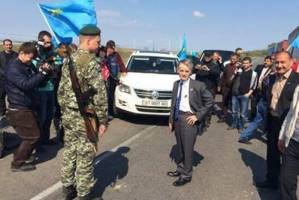Crimean Tatar activists jailed: Closed court and bizarre charges

Charges over a supposed incident 6 months ago which result in three men being remanded in custody for (at least) two months are already a matter of concern. In this case, the court and prosecution have clearly not even learned their roles, with the charges and the claims of ‘Right Sector’ involvement and extremism seeming unrelated.
On Oct 24 Crimean Tatar activist Tair Smedlyaev was remanded in custody for two months at a closed court hearing. The Crimean Field Mission on Human Rights reports that the judge based the ruling on the prosecution’s claim that 60 people have asserted that Smedlyaev is an ‘extremist’. There was apparently also a statement from the Crimean ‘Centre for Countering Extremism’ which claimed that Smedlyaev is also a member of the Ukrainian nationalist organization ‘Right Sector’.
As reported, Tair Smedlyaev, brother of the head of the Central Election Commission of the Qurultay, or Crimean Tatar National Congress, was arrested in Stary Krym on Oct 22. His car was stopped on the road while he was driving with two sons, one only three and a half years old. The little one became understandably upset at the sight of his father being taken away by force, which in turn led to his father’s blood pressure rising dangerous and in the police holding centre an ambulance needed to be called several times.
This is the third arrest in a week, following those of Musa Alkerimov on Oct 16 and Rustam Abdurakhmanov a day later.
Emil Kurbedinov, Smedlyaev’s lawyer says that the detention order is not even related to the charges laid against his client. Smedlyaev and the other two are accused of ‘using violence against a representative of the authorities’. Kurbedinov comments: “In the police’s opinion, a representative of the authorities experienced stress as the result of the accused’s actions, and could not work”.
The charges are overtly questionable and pertain to the events on May 3 when around 5 thousand Crimean Tatars came to meet veteran Crimean Tatar leader Mustafa Dzhemiliev at the Armyansk crossing between the Kherson oblast in mainland Ukraine and the Crimea. The 71-year-old former political prisoner and Ukrainian MP had been stopped from flying to Simferopol the day before, and it seemed clear that the authorities, despite initial denials, were going to impose the extraordinary 5-year-ban on Dzhemiliev entering his native Crimea while under Russian occupation.
Mustafa Dzhemiliev and the Crimean Tatars who came to meet him were confronted by Russian OMON riot police and Crimean ‘police’. It was decided that Dzhemiliev would return to Kyiv in order to avert bloodshed. There were protests that day, and some roads were blocked, but there were no reports of any ‘representative of the authorities’ having in any way suffered.
Natalya Poklonskaya, the so-called ‘Crimean prosecutor’ immediately announced criminal investigations over supposed ‘extremism’, and a number of people were fined on administrative charges related to the protests. Any other charges 6 months on would already strain credulity, but remanding three people in custody of (a minimum of) two months looks very much like open intimidation, aimed at warning other Crimean Tatars of what they could expect.
Nikolai Zboroshenko from the Crimean Human Rights Field Mission fears that this may become a Crimean version of the Bolotnaya Square prosecutions. The fact that the men have been remanded in custody, judging by the cases in Russia over anti-Putin demonstrations on Bolotnaya Square on May 6, 2012 , probably means that real prison terms are planned.
Nariman Dzhelyal, deputy head of the Mejlis, or representative body of the Crimean Tatar people says that aside from providing legal aid, there is not much they can do. They need to be clear that under Russian occupation, the authorities will come down heavily on any attempts to hold peaceful protest or in other ways freely express their views.





